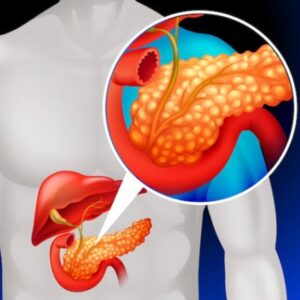Vitamin B12, also known as cobalamin, is a water-soluble vitamin that plays a crucial role in various physiological processes in the body. Here’s a detailed description of vitamin B12:
- Sources: Vitamin B12 is primarily found in animal-derived foods such as meat (especially liver), fish, eggs, dairy products, and fortified cereals. It is not naturally present in plant-based foods, making it essential for vegetarians and vegans to obtain B12 from fortified foods or supplements.
- Function: Vitamin B12 is involved in several key functions in the body:
- Red Blood Cell Formation: B12 is necessary for the production of red blood cells in the bone marrow. Deficiency can lead to megaloblastic anemia, characterized by larger-than-normal red blood cells.
- Neurological Function: B12 is crucial for the maintenance of the nervous system and the production of myelin, a protective sheath around nerves. Deficiency can lead to neurological symptoms such as tingling or numbness in the hands and feet, muscle weakness, and cognitive impairments.
- DNA Synthesis: B12 is involved in the synthesis of DNA, the genetic material in cells. It is essential for cell division and growth.
- Absorption: Vitamin B12 requires a complex process for absorption in the body. It binds to intrinsic factor, a protein produced by the stomach, which facilitates its absorption in the small intestine. Certain factors, such as aging, gastrointestinal disorders, or medications, can impair B12 absorption, leading to deficiency.
- Deficiency: Vitamin B12 deficiency can occur due to inadequate dietary intake, malabsorption disorders (such as pernicious anemia), gastrointestinal surgery, or certain medications (such as proton pump inhibitors or metformin). Symptoms of deficiency may include fatigue, weakness, pale skin, shortness of breath, neurological symptoms, and cognitive impairment.
- Testing: Vitamin B12 levels can be measured through blood tests, such as serum B12 levels or methylmalonic acid (MMA) levels. Elevated MMA levels are indicative of B12 deficiency. Testing for B12 deficiency is important for diagnosing and managing the condition, as untreated deficiency can lead to serious health complications.
- Treatment: Treatment for B12 deficiency typically involves B12 supplementation through oral supplements, intramuscular injections, or nasal sprays. In cases of malabsorption, high-dose oral supplements or injections may be necessary to correct deficiency.
Overall, vitamin B12 is essential for maintaining red blood cell production, neurological function, and DNA synthesis. Adequate intake through diet or supplementation is necessary to prevent deficiency and support overall health and well-being.






Reviews
There are no reviews yet.